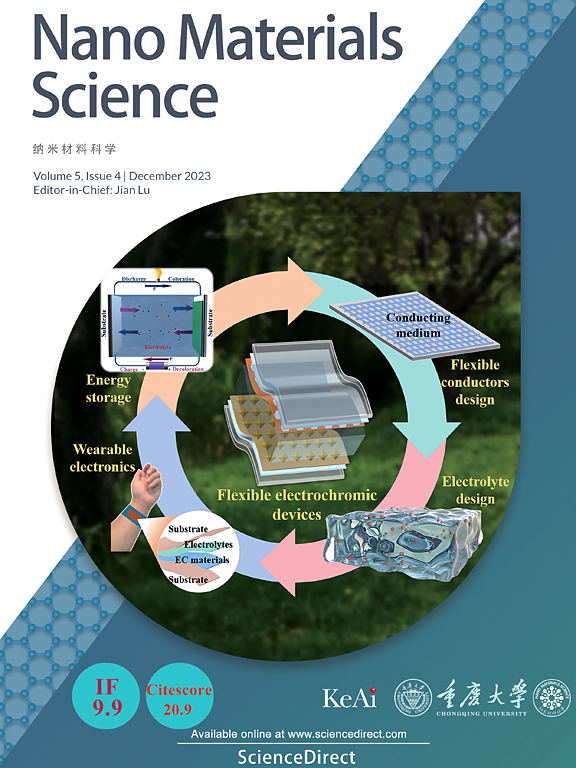Synthesis of binary and ternary MOF/carbon based composites (MOF/carbon nitride/graphene oxide) for the visible-light assisted destruction of tetracycline and textile dye
IF 17.9
2区 材料科学
Q1 Engineering
引用次数: 0
Abstract
Herein, binary and ternary MOF/carbon based composites (MOF/Carbon nitride/Graphene oxide) (novel binary (NH2-MIL-88B(Fe)/g-C3N4) (MOF/Carbon nitride) and ternary (NH2-MIL-88B(Fe)/g-C3N4/GO) (MOF/Carbon nitride/Graphene oxide) composites) were synthesized and used as photocatalysts for the elimination of Direct Red 23 (D-Red23) and Tetracycline Hydrochloride (TC-H). NH2-MIL-88B(Fe)/g-C3N4/GO (MILB/g/GO) ternary composites with three different amounts of GO including 3, 7, and 11 wt% were synthesized and denoted as MILB/g/(3%)GO, MILB/g/(7%)GO, and MILB/g/(11%)GO. g-C3N4 and GO (with three different amounts 3, 7, and 11 wt%) were incorporated to synthesize MILB/g/(3%)GO, MILB/g/(7%)GO and MILB/g/(11%)GO ternary composites. Several analyses were used to characterize the materials. The MILB/g/(3%)GO demonstrated the highest pollutant degradation efficiency. The degradation rate of dye and Tetracycline after 70 min of light radiation using MILB/g/(3%)GO in a photo-Fenton-like reaction was about 99% and 96%, respectively. The creation of a heterojunction structure using g-C3N4, and the simultaneous incorporation of the optimum amount of GO led to a remarkable amelioration in photocatalytic properties and the extraordinary performance of MILB/g/(3%)GO in the pollutants degradation process.
合成二元和三元 MOF/碳基复合材料(MOF/氮化碳/氧化石墨烯),用于可见光辅助破坏四环素和纺织染料
本文合成了二元和三元MOF/碳基复合材料(MOF/氮化碳/氧化石墨烯)(新型二元(NH2-MIL-88B(Fe)/g-C3N4) (MOF/氮化碳)和三元(NH2-MIL-88B(Fe)/g-C3N4/GO) (MOF/氮化碳/氧化石墨烯)复合材料),并将其作为光催化剂用于直接红23 (D-Red23)和盐酸四环素(TC-H)的消除。合成了NH2-MIL-88B(Fe)/g- c3n4 /GO (MILB/g/GO)三元复合材料,其中氧化石墨烯的添加量为3、7和11wt %,分别表示为MILB/g/(3%)GO、MILB/g/(7%)GO和MILB/g/(11%)GO。g- c3n4和氧化石墨烯(3、7和11 wt%)分别合成了MILB/g/(3%)氧化石墨烯、MILB/g/(7%)氧化石墨烯和MILB/g/(11%)氧化石墨烯三元复合材料。用了几种分析方法来表征材料。MILB/g/(3%)GO的污染物降解效率最高。MILB/g/(3%)氧化石墨烯在光- fenton -like反应中对染料和四环素的降解率分别为99%和96%。利用g- c3n4建立异质结结构,同时加入最优量的氧化石墨烯,显著改善了光催化性能,并且在污染物降解过程中表现出非凡的MILB/g/(3%)氧化石墨烯。
本文章由计算机程序翻译,如有差异,请以英文原文为准。
求助全文
约1分钟内获得全文
求助全文
来源期刊

Nano Materials Science
Engineering-Mechanics of Materials
CiteScore
20.90
自引率
3.00%
发文量
294
审稿时长
9 weeks
期刊介绍:
Nano Materials Science (NMS) is an international and interdisciplinary, open access, scholarly journal. NMS publishes peer-reviewed original articles and reviews on nanoscale material science and nanometer devices, with topics encompassing preparation and processing; high-throughput characterization; material performance evaluation and application of material characteristics such as the microstructure and properties of one-dimensional, two-dimensional, and three-dimensional nanostructured and nanofunctional materials; design, preparation, and processing techniques; and performance evaluation technology and nanometer device applications.
 求助内容:
求助内容: 应助结果提醒方式:
应助结果提醒方式:


